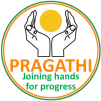Global pragathi and Pragathi Welfare Society teamed up with Padala Charitable Trust to conduct two programmes – Student Empowerment Training (SET) Program and SWECHHA Program – in ZP High Schools of Farooqnagar and Shadnagar Mandals, Telangana State in 2016-17. Taboos were removed when several village women and high school girls were educated and Pragathi team members trained. Subsequently, our own Sneha program was implemented and 1.2 million pads also distributed in over 250 villages. It is found that 23% of girls in India leave school when they start menstruating and the rest between the ages of 12 and 18 miss an average of five days during each month during the menstrual period. These girls are unaware about the safe methodologies during menstruation and fall prey to unscientific myths and taboos.The vision of the project is to raise awareness in girl children in rural areas about menstruation and relevant health issues. The program provides (a) Awareness on how to improve menstruation hygiene, personal hygiene, health and diet, (b) Directions on the use of sanitary napkins and safe methodology for their disposal, and (c) Opportunity for awareness to spread to parents through these girls. During the program, the girls showed a lot of interest and paid good attention. They asked several questions to clear their doubts. They said many of their misconceptions about menstrual hygiene were cleared by the program. They promised to use safe methods and even educate their mothers and grandmothers about it.
Experience of Ms Vinaya Gogineni, Medical Student, Univ. of Toledo ( January - Feb 2017):
I have always been familiar with the societal issues in India, but I was wary of making assumptions and exaggerating the truth. Too often, the news is skewed by media bias or inaccuracy of data collection. As a result, I knew that interacting with individuals at the ground level would be the best method for obtaining authentic information. Furthermore, long-term impact of the project work was a priority from the very beginning, and in order to inspire change and potentially alter current policies, statistical evidence is necessary. I realized that it would be very difficult to work effectively without the support of a well-established organization, so after doing research, I came into contact with the founder of Global Pragathi, a nonprofit dedicated to transcending political and socioeconomic barriers and serving the underprivileged. Through Global Pragathi, the umbrella organization, I was able to partner with SWECHHA, another organization that already had roots in India and was dedicated to improving adolescent girls’ health and hygiene. After approximately a year of collaboration, a two-fold plan was formulated in order to address the issue of how menstrual hygiene was being addressed in rural areas. Full immersion in the village culture was deemed necessary in order to comprehend the dynamic of rural India. A significant portion of the work was behind the scenes, specifically regarding the compilation and analysis of surveys for the research component.
This entailed the compilation of research, designing of skits to encourage more student interaction, and editing and testing out the surveys. By collaborating with various organizations and health officials, I finalized a survey to distribute to women of all ages. Since the purpose of the trip was to understand the impact that society has on women of menstruating age, I made sure to include factors such as age, family background, education level, knowledge of subject prior to the program, and more. The experience consisted of administering surveys at the schools and hospitals and following up with educational sessions about various factors related to menstrual hygiene (biological process, social stigmas, acceptable disposal techniques, etc). The survey responses were compiled in an excel document for further analysis. Since the project is long-term, the data will be used to spread awareness and support proposals for policy changes in the education department.


